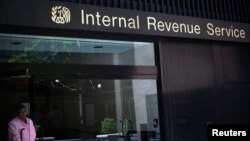The Internal Revenue Service - or IRS - is the U.S. federal government's tax-collecting agency, bringing in about $2.4 trillion in revenue this year. The agency's 90,000 employees touch every sector of American society, including individual taxpayers, small businesses, large corporations, and tax-exempt organizations.
Under U.S. law, certain charitable, religious, educational and cultural organizations are tax exempt, meaning they do not have to pay federal taxes on their activities.
At the heart of the current IRS scandal is a tax exempt status known as 501(c)(4)
The groups the IRS targeted for extra scrutiny in applying for 501(c)(4) status oppose many of the Obama administration's spending and tax policies. The extra scrutiny delayed applications and forced many small groups to close during the past presidential election campaign.
According to law, these groups "must not be organized for profit and must be operated exclusively to promote social welfare ... civic betterment and social improvements."
The IRS said these groups may engage in some political activities, so long as that is not its primary activity, and they may also engage in lobbying. But they are not to act on behalf of or in opposition to any candidate for public office.
Under U.S. law, certain charitable, religious, educational and cultural organizations are tax exempt, meaning they do not have to pay federal taxes on their activities.
At the heart of the current IRS scandal is a tax exempt status known as 501(c)(4)
The groups the IRS targeted for extra scrutiny in applying for 501(c)(4) status oppose many of the Obama administration's spending and tax policies. The extra scrutiny delayed applications and forced many small groups to close during the past presidential election campaign.
According to law, these groups "must not be organized for profit and must be operated exclusively to promote social welfare ... civic betterment and social improvements."
The IRS said these groups may engage in some political activities, so long as that is not its primary activity, and they may also engage in lobbying. But they are not to act on behalf of or in opposition to any candidate for public office.





